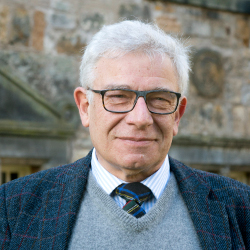Christoph Schwoebel 1955-2021

Update 22 Sept 2021, 8.20pm: An online book of condolence is now available where visitors may leave a comment.
Christoph Schwöbel studied at the Kirchliche Hochschule Bethel and the University of Marburg, before taking his first academic post as Lecturer in Systematic Theology at King’s College London in 1986. With Colin Gunton, he founded the influential Research Institute for Systematic Theology at King’s in 1988, and he served as its Director until 1993, when he left London to take up a chair in Kiel. Christoph had a glittering career in Germany: he moved to Heidelberg in 1999, and to Tübingen in 2004, and served academy and church with great distinction, notably as chair of the Wissenschaftliche Gesellschaft für Theologie from 2008 to 2011; as editor of the leading journal Die Neue Zeitschrift für Systematische Theologie und Religionsphilosophie since 2007; as a member of the Leuenberg Fellowship from 1989 to 1994, drafting its influential statement, ‘The Church of Jesus Christ’; and as co-chair of the Meissen Conference, which brings together the Church of England and the Evangelische Kirche in Deutschland, from 2004 to 2010.
He returned to the UK, to St Andrews, in 2018 to take our Chair of Divinity, established in 1643. His teaching here was inspirational, from introductory doctrine for first-year undergraduates to seminar programmes for doctoral students. Unsurprisingly, long queues formed, wanting to study with him, but he was generous with his time to all students and colleagues, and committed to the flourishing of the School. He was a founding father of our ongoing St Andrews Encyclopaedia of Theology project and gave himself selflessly to the task of making it the best it could be.
Christoph was committed to the worldwide church, with a particular focus on Asia, where he maintained strong relationships and helped found the East-West Theological Forum. He was also deeply committed to inter-religious dialogue, and his work in promoting Christian-Muslim conversation and understanding, both individually and institutionally, will be of lasting significance.
Over his career he published six monographs, about two dozen edited volumes, and several hundred journal articles or book chapters. His writings have shaped the discipline in very significant ways, but those of us who knew him would say his presence and personality were more transformative than even his writings were.
Christoph had a zest for life and cultivated a wide acquaintance. Everyone who knew him was drawn to his passion and his joy in seeking to explicate the gospel. We are all the poorer for his passing, but we remember particularly his children Martin, Christine, Johannes, Stephan, and Simon and Jonathan, and his widow Katrin.